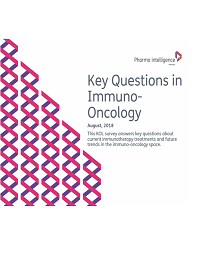Report Library
All Reports
Key Questions in Immuno-Oncology
August 08, 2018
This KOL survey answers key questions about current immunotherapy treatments and future trends in the immuno-oncology space.
In partnership with Skipta, we performed an 18-question survey of 26 oncologists practicing throughout the US.
All 26 respondents included in this survey are members of Skipta’s Oncology Nation community and attended the 2018 American Society of Clinical Oncology (ASCO) annual meeting, where numerous trial results and updated analyses on immunotherapies were presented.
The survey includes questions derived from ASCO presentations, as well as general immunotherapy-focused questions surrounding important mechanisms of action, medicines, and general practice within the immuno-oncology field.
If you are a KOL Insight Subscriber, please access the survey from our KOL Insight portal (Subscribers only).
Biomedtracker will be offering KOL Reports and Physician Pulse Surveys for purchase a la carte, or access to all reports and surveys can be purchased as a subscription to KOL Insight. For more information on KOL Insight subscription, please email Biomedtracker or call Biomedtracker Client Services at (858) 200-2357.
For our disclosures, please read the Biomedtracker Research Standards.
Survey Questions:With PD-1/PD-L1 inhibitors gaining approval for first-line patients across all PD-L1 expression levels, how likely are you to conduct PD-
L1 expression testing in the future?
What proportion of your locally advanced or metastatic NSCLC patients do you currently test for PD-L1 expression?
Should Opdivo plus Yervoy (ipilimumab; Bristol-Myers Squibb) gain regulatory approval for high-TMB NSCLC patients, how likely are you
to conduct both TMB and PD-L1 expression testing?
How significant will cost be as a factor in deciding whether to conduct both TMB and PD-L1 expression testing?
For ALK rearrangement-positive and EGFR mutation-positive NSCLC patients, how likely are you to prescribe PD-1/PD-L1 inhibitors in
those who have failed previous ALK- or EGFR-targeted tyrosine kinase inhibitors?
What is your current preferred PD-1/PD-L1 inhibitor in previously treated NSCLC patients?
Which of the following statements best represents your opinion of vaccine therapies in brain cancer?
Early-phase data for PD-1 inhibitor Keytruda showed a combined DCR of 23% in docetaxel refractory mCRPC patients regardless of PD-
L1 expression. All patients received at least one next-generation endocrine therapy (ie enzalutamide or abiraterone) and one
chemotherapy regimen. Grade 3–5 AEs were approximately 12% with Keytruda. If these results hold for larger pivotal studies, what is your
view of Keytruda in mCRPC?
Given the recent clinical trial holds for Keytruda and the discontinuation of Tecentriq's development in multiple myeloma due to an
increase in mortality, do you think there is still a role for PD-1/PD-L1 inhibition in this indication? On a scale of 1 (not likely) to 5 (highly
likely), how likely do you think PD-1/PD-L1 inhibitors are to reach the market?
In your opinion, which immunotherapy combination has the most clinical potential in the treatment of first-line RCC patients?
Several trials are investigating the potentially synergistic combination of PD-1/PD-L1 and PARP inhibitors in HER2-negative breast
cancer. In your opinion, which of these mechanisms is most promising for the treatment of HER2-negative breast cancer patients?
Which of the following statements best represents your willingness to prescribe patients immunotherapies in indications for which
they have been granted accelerated approval?
What percentage of your patients currently being treated with pharmacological therapy are receiving an immunotherapy? And, in five
years, what percentage of your pharmacologically treated patients do you estimate will be receiving an immunotherapy?
Of all of your patients who are candidates for immunotherapy, what proportion are not able to receive treatment with immunotherapy
due to financial reasons (eg out-of-pocket costs of treatment, inadequate insurance coverage, payer preference, etc)?
In your opinion, which of the following novel immunotherapy mechanisms that were featured in presentations at ASCO 2018 has the
most clinical potential?
Based on the data available so far, do you think combinations featuring IDO inhibitors continue to have a place in development?
Please select the statement that best reflects your thoughts on the potential of IDO inhibitors.
Many presentations surrounding CAR-T therapies at ASCO were focused on fine-tuning their use in the clinical setting. In your opinion,
what are the most pressing safety and efficacy priorities that need to be addressed with regards to current CAR-T therapies and those
which may enter the market in the near future?
In partnership with Skipta, we performed an 18-question survey of 26 oncologists practicing throughout the US.
All 26 respondents included in this survey are members of Skipta’s Oncology Nation community and attended the 2018 American Society of Clinical Oncology (ASCO) annual meeting, where numerous trial results and updated analyses on immunotherapies were presented.
The survey includes questions derived from ASCO presentations, as well as general immunotherapy-focused questions surrounding important mechanisms of action, medicines, and general practice within the immuno-oncology field.
If you are a KOL Insight Subscriber, please access the survey from our KOL Insight portal (Subscribers only).
Biomedtracker will be offering KOL Reports and Physician Pulse Surveys for purchase a la carte, or access to all reports and surveys can be purchased as a subscription to KOL Insight. For more information on KOL Insight subscription, please email Biomedtracker or call Biomedtracker Client Services at (858) 200-2357.
For our disclosures, please read the Biomedtracker Research Standards.
Survey Questions:
| Disease Group Covered: | Oncology |
| Indications Covered: | Castleman's Disease |
